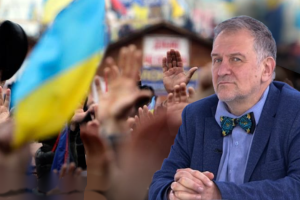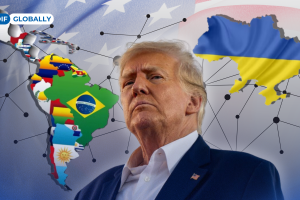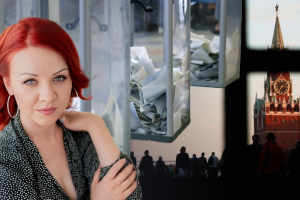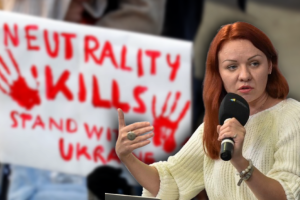The presidential campaign in Ukraine: new front-runners and old challenges
Ruslan Kermach,
associate expert at Ilko Kucheriv Democratic Initiatives Foundation
Given the new trends of the Ukrainian presidential campaign and the unexpected leadership of the candidate-comedian Volodymyr Zelenskiy in the polls, one can well expect the consolidation of the political heavyweights Yulia Tymoshenko and Petro Poroshenko to counter a non-system player who is nevertheless capable of burying their chances of political success in the upcoming elections.
The official start of the presidential election campaign in Ukraine at the beginning of 2019 has brought some tangible and partly unpredictable changes to the overall structure of electoral preferences of Ukrainian citizens. Virtually all pre-election polls held in 2018 demonstrated the indisputable leadership of Yulia Tymoshenko as a potential candidate for the presidency. The main pursuers of Tymoshenko, including Anatoliy Grytsenko, Petro Poroshenko, Volodymyr Zelenskiy and Yuriy Boyko, for some periods of time in 2018 had a slight lag in support between each other (often within the statistical margin of error) and shared the second position in the rating of candidates.
In such a situation it was hard to pinpoint an obvious second-favourite candidate of the upcoming presidential campaign. The only clear information demonstrated by these polls was that Tymoshenko is in the lead, but it remained to be seen who will be the main contender able to bid with her in the second round of the upcoming election. As it stands now, it appears that Poroshenko and Zelenskiy will be her most likely challengers.
New tendencies of the presidential campaign
The start of the presidential election campaign this year, and some of the events preceding it, have significantly altered the balance of public support between the major candidates and made the outlines of the second round of elections more pronounced. The relevant studies of public opinion in Ukraine have identified several key tendencies.
First and foremost, the major surprise of the election campaign of the recent months in Ukraine was the rapid growth of the electoral weight of the candidate-comedian Volodymyr Zelenskiy in 2019. This new tendency has been evidenced by several recent opinion polls in Ukraine (Razumkov Center, KIIS, Info Sapiens for Greenberg Quinlan Rosner Research).
The rise of Zelenskiy’s rating over the last time was so dynamic that, according to virtually all of the reputable sociological services, he managed to noticeably outperform all of the major rival candidates and to become the clear leader in public sympathy among Ukrainians.
Moreover, sociologists point to the growing lead of the candidate Zelenskiy over his key competitors in the Ukrainian presidential elections. While in January 2019 Zelenskiy garnered 19 per cent of support and did not have a statistically significant advantage over his competitors, according to Rating Group Ukraine, a fresh KIIS survey in February of this year recorded his support at almost 27 per cent among the decided respondents in Ukraine. Moreover, according to the above-mentioned KIIS survey, the candidate-comedian is ahead of the closest pursuer, Petro Poroshenko (most recently polling at 17.7 per cent), by a noticeable margin.
At the same time, the ratings of the long-assumed front-runner of the presidential race – Yulia Tymoshenko – demonstrate a tendency towards stagnation and even certain decline. After reaching peak rates in October-November 2018 (at 21 per cent), as per Rating Group Ukraine, Tymoshenko’s rating started to wane to 18 per cent in early 2019, shifting the leader of the Batkivshchyna political party to the second and even third positions in the consolidated ratings of the presidential candidates. However, given the rapid approach of the actual presidential election on March 31st 2019 and Tymoshenko’s possession of the stable electoral core in Ukraine, she is likely to stay in at least the top three of the campaign favourites.
Meanwhile, one should note the evident growth over the last few months of incumbent president Poroshenko’s ratings, which allowed him to gain a foothold along with Tymoshenko and Zelenskiy in the top three of the electoral leaders, leaving behind candidates of the apparently second tier – Yuriy Boyko, Anatoly Grytsenko and Oleg Lyashko.
Most of the experts in Ukraine explain the strengthening of Poroshenko’s position by his recent success related to church affairs, namely the granting of autocephaly (Tomos) to the the newly-created Orthodox Church of Ukraine by the Ecumenical Patriarch Bartholomew I in the beginning of 2019. This was presented as “another act of declaring independence” for Ukraine and was to much extent the result of the activities undertaken by the presidential team. Knowing how significant this autocephaly is for Ukraine, it should come as no shock that Poroshenko has been actively campaigning around this topic. It has been reflected in the placement of numerous thematic billboards all over Ukraine, as well as launching the so called “Tomos-tours”, a series of regional presidential trips aimed to bring Ukrainians information about the creation of a united Orthodox Church of Ukraine.
Thus, against the backdrop of the current electoral trends, the most likely contenders for entering the second round of the upcoming presidential elections in Ukraine are the candidates Tymoshenko, Poroshenko and Zelenskiy.
Challenges for the “big three” candidates
Each of the three above-mentioned favourites of the runoff has both their own strengths and potential vulnerabilities that might turn out to be the main obstacle preventing them from entering the second round of presidential elections in Ukraine this year.
Candidate-comedian Zelenskiy, despite rapidly growing public support over the recent months and his actual primacy in the combined ratings of candidates for presidency, is likely to face the greatest difficulties in terms of mobilising his supporters. Unlike his main competitors – Tymoshenko and Poroshenko – Zelenskiy relies on the support of primarily young Ukrainians below the age of 30. According to sociological data, Zelenskiy’s support among young people under 30 (at 31 per cent) is more than three times higher than among potential voters aged 50-59 (at nine per cent). The experience of the previous elections in Ukraine testifies to the fact that young people tend to demonstrate comparatively lower turnout during elections. In this regard, there is a high probability that the support of a significant part of young Zelenskiy-sympathizers will not convert into real votes in favour of the candidate when and where it counts.
In contrast, the main electoral core of Petro Poroshenko and Yulia Tymoshenko – middle-aged and older people – seems to be more disciplined and reliable. Consequently, the chances of the aforementioned candidates to obtain results that are reflected in their current support ratings are noticeably higher than those of the “non-system” candidate Zelenskiy. It is also important that the political heavyweights, such as candidates Poroshenko and Tymoshenko, have strong party cells and structures on the ground, which allow them to more effectively mobilise local voters and defend their votes at the counting stage.
At the same time, the candidate Zelenskiy is running a rather technological and non-standard campaign. He is actively using Internet and new media and effectively exploits the protest attitudes and grievances of Ukrainians, which can also contribute to a more productive mobilisation of the youth electorate, despite past poor voting performances of such a segment of voters. Thus for Zelenskiy it is of crucial importance that his predominantly young supporters turn out to vote in high numbers in order for him to earn a spot into the second round of presidential elections in Ukraine, while for both of his key competitors the main task is to prevent this from happening.
This is due to the fact that both Tymoshenko and especially Poroshenko, as representatives of the old and to a large extent discredited political elite, have a fairly high level of public mistrust in Ukraine. Both of them were the key bidders of the previous presidential election of 2014 in Ukraine, which among other reasons colour them as “systemic”, “establishment” candidates of the “old guard” in the eyes of many disillusioned Ukrainian voters.
According to a recent public opinion poll, almost every second respondent in Ukraine (in other words, 50 per cent) will under no circumstances vote in the upcoming presidential elections for incumbent president Poroshenko, while almost 30 per per cent will not support the candidacy of Tymoshenko. Considering the existing public attitudes towards both Tymoshenko and in particular Poroshenko, if one (or both) of them gets into the second round of the presidential election, they will have to face the challenge of expanding their electoral support. This is not an easy task, given the sufficient levels of public distrust mentioned earlier.
Candidate-comedian Zelenskiy has not lost his public credibility so far; only 12 per cent of respondents are definitely not ready to vote for him. Should he make it to the second round of the presidential election, he will have a much greater chance of winning there as a “new face” in politics and as the presumed “lesser evil” in the eyes of a significant part of the Ukrainian voters.
This is also confirmed by the recent polls data: in the event the Zelenskiy runs in the second round of presidential election with Yulia Tymoshenko, at the moment he is projected to win with a ten per cent margin (28.7 per cent against 18.6 per cent), and he overtakes incumbent president Poroshenko with an even higher margin (32.2 per cent against 19.1 per cent).
The intrigue regarding the Ukrainian election is growing each day of the election campaign. Given the new trends of the campaign and the unexpected leadership of the candidate-comedian Zelenskiy in the ratings, one can well expect the consolidation of the political heavyweights to counter a dangerous non-system player who is nonetheless capable of burying their chances of political success in the upcoming elections.
Ruslan Kermach is an associate expert at the Ilko Kucheriv Democratic Initiatives Foundation (DIF) in Kyiv, Ukraine.








